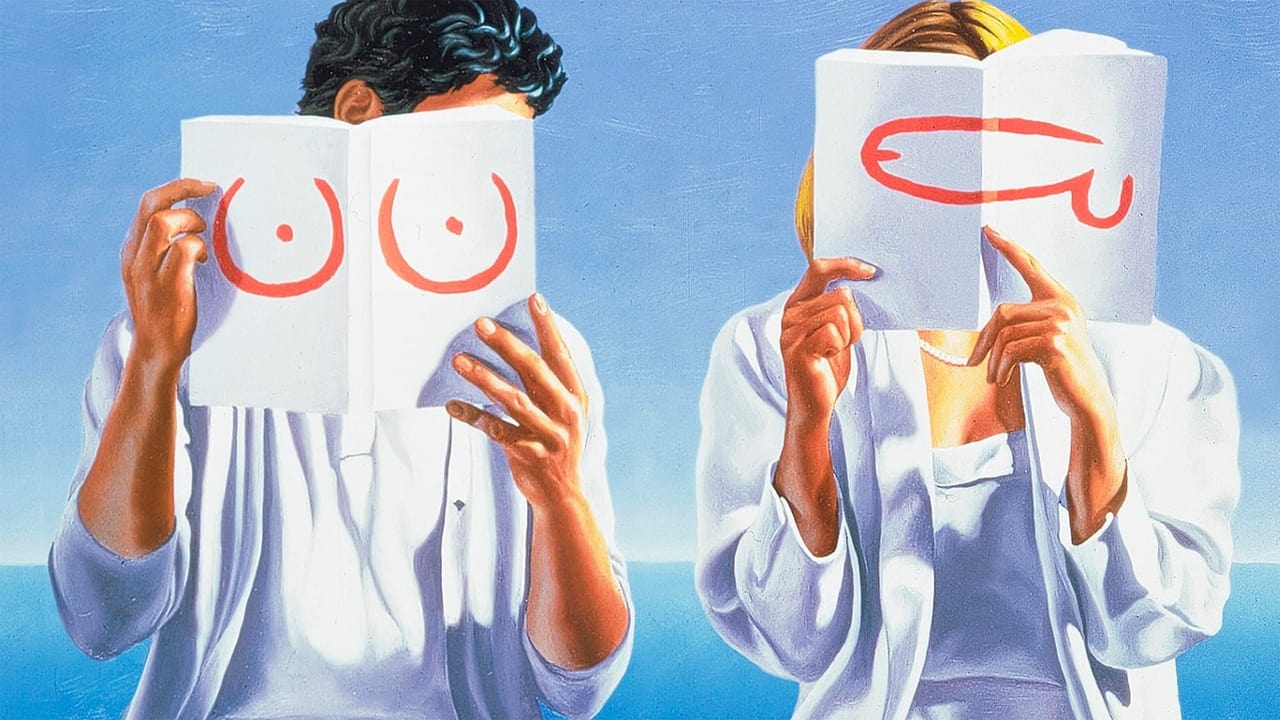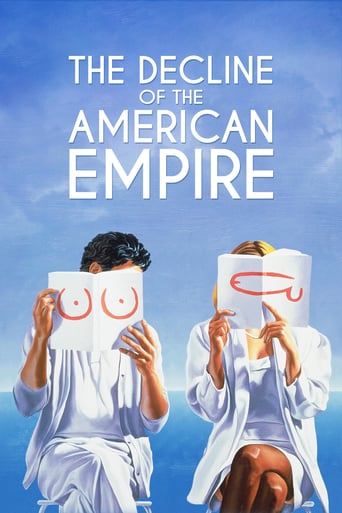



Highly Overrated But Still Good
As somebody who had not heard any of this before, it became a curious phenomenon to sit and watch a film and slowly have the realities begin to click into place.
View MoreMostly, the movie is committed to the value of a good time.
View MoreAll of these films share one commonality, that being a kind of emotional center that humanizes a cast of monsters.
View MoreI never had a good reason to add a review to the existing ones on IMDb, but this time I was appalled by the lack of critical thinking displayed by the majority of the reviewers. This movie is *not* about sex, *not* about the sexual lives of the characters, and *not* about the battle of the sexes. As the title explicitly states, It is about the moral decline of a society, which in this particular case is made manifest through the over- indulging of the main characters on their sexual life and on their own personal gratification, at the expenses of their families, friends, and social group at large. This line of thought is made clear at the beginning of the movie. First, we see the main character – Remy – explaining the role of numbers in history, and claiming there is no place for morality in history, and thus drawing a line between personal and public history.We then see Diane – one of the main characters – interviewing Dominique – the chairperson of the History department – who has just written a book entitled "Changing Concepts of Happiness". She draws a parallel between the American society at large/Empire and the Roman Empire, arguing that the search for personal happiness is associated with the decline and fall of a society. When people are too concerned with seeking quick gratification of their appetites while ignoring their responsibilities within family and larger social group, society is doomed to collapse.And what we learn from the dialogues and the interactions that follow proves just that. What we see is that the lives of these so-called intellectuals are only marginally interested in history and the intellect. Their lives are centred around their never ending sex-hunt, and around the lies they consciously tell in order to hide the things that even according to their moral standards are considered rather unacceptable. Their relationships are fundamentally shallow and deceptive, and towards the end of the movie the whole sand castle comes crumbling down, and all is left is a huge nothingness, their nihilism, their lack of moral values and ideals. And so the story comes full circle while the characters sit together and listen to Dominique's interview, which reiterates the theme of decay, and is also the catalyst that will make the castle crumble down.The dialogues are absolutely brilliant, and it is perhaps easy to be absorbed and forget about the broader theme, and when the movie ends you are left with a sense of desolation, even desperation, the same feelings that permeate the character's lives.
View MoreThis Québécois, i.e. Canadian made French language film, is definitely not one I would have heard or perhaps of cared before I saw its inclusion in the book 1001 Movies You Must See Before You Die, I hoped I would agree with this and other critical opinions. Basically four academic intellectual friends, four men and four women, all from the Department of History at the Université de Montréal, are gathering for a dinner at a rambling and secluded country house. The men are married Rémy (Rémy Girard), homosexual Claude (Yves Jacques), involved with a girlfriend Pierre (Pierre Curzi) and bachelor Alain (Daniel Brière) who spend time discussing political and professional topics, but mostly women, the female body and sex. The women are Rémy wife of 15 years Louise (Dorothée Berryman), spinster Dominique St. Arnaud (Dominique Michel), divorcée Diane Leonard (Louise Portal) and Pierre's girlfriend Danielle (Geneviève Rioux) are spending time in the gym downtown also discussing politics and professional stuff, and also their sexual affairs and opinions of men. It is after the dinner is prepared and they all gather at the table that tensions arise, when it turns out one of the women may have had an affair with two of the men, one being married, and they are also joined by ninth guest Mario (Gabriel Arcand) who only adds more stress to the situation. The acting is all fine, and the story is relatively simple, it is the mix of flashbacks and the dialogue full of sexual exploits and experiences that is most interesting to watch, it also adds to the concept of character imperfections creating complications, it is a watchable comedy drama. It was nominated the Oscar for Best Foreign Language Film. Very good!
View Morerecently saw 'les invasions barbares' by this film's director denys arcand, the papa of the cinema-du-papa of french canada. it's a film centered on 'le declin's' Remy character, a pain-in-the-ass married, chauvinist, leftist academic, his strained relationship with his grown son, and his world-weary, academic friends who come to his side before his impending death. i thought it was rather interesting and i quite liked it. an intelligent exploration of the cost of the way we live our lives--politically, morally, and socially. then, i rented 'jesus de montreal,' a scathing intellectual critique of the commerciallization of the arts in canada. i liked that one too. then, i watched 'le declin de l'empire americain,' which is the prequel to 'les invasions.' i realized how much arcand has developed in some ways in between these two films, his vision has matured. however, i realize that 'le declin' smacks of the sort of thing that hovers on the edges of his other two better films, sexism, of course, but more insidiously, a nonchalant racism that is never addressed as a political issue despite the fact that everything else is. it's the kind of film that makes makes the contempt i hold for white liberal intellectuals that much wider and deeper and alienates me from their white smugness. for example, in both 'les invasions' and 'le declin,' there is this particularly insidious aside of the main character's apparent racist fascination with 'les femmes asiatiques.' in two identical shots of an asian woman's face, holding the prototypical fetishized gaze of the male speaker, he goes on about his desire for her. it's so bloody demeaning and why the hell does Remy/Arcand repeat himself like this in these two films? is it to show the level of this character's sexual appetite by throwing in the classical emblem of the other, an asian woman? how incredibly oversexed he is to express his particular fetish for 'les vietnamiennes' or 'les chinoises?' it's freaking sick. and it's even more sick because it's completely apolitical in a film that politicizes everything else, including white women's sexual attitudes. the subaltern cannot speak. in another scene, this really embittered, nightmarish white woman academic talks about her sexual adventures in martinique where she has a three-way with a couple of black martiniquains. she says that it was fine except when they 'opened their mouths.' then she mimics their pathetic patois in a contemptuous, racist tone. this is completely messed up. i guess it's a critique of this character, but still, again, here is the apolitical treatment of race in a liberal, political film. why? it adds nothing to the film and is an insult to people of color who watch this. or maybe denys arcand doesn't think people of color would go see his films?i have many reservations about denys arcand. he may be canada's 'best filmmaker' but he's kind of a scourge of racist, white, international, feelgood art cinema, a mon avis...
View MoreThis movie seems to be dividing commenters which can only be a positive sign. In the first negative comment I read the writer chose to remind us that film is a Visual medium and whilst that is true if we take it to its logical conclusion we will, by definition, look forward to a return of the Silent film. I find it difficult to believe that anyone who is sufficiently interested in movies to post comments is not going to wander into a movie theatre with no idea of what is playing. Okay, if you pay the going rate at the box office hoping to see a mindless popcorn movie/slasher/techno and after a couple of minutes you realise you're gonna hafta THINK about this one, then, sure, you got a beef, but by the same token aren't you kinda foolish in not checking SOMETHING about the movie currently playing and ideally reading at least one review that will mention the topic. I, for example, have never seen 'My Dinner With Andre', simply because it has never played in a theatre near me when I have been able to get there. BUT, I DO know that it is about two guys having dinner and talking so if I do eventually go and see it I can't really complain that it's not Eddie Murphy fodder. I MAY take exception to the KIND of conversation on offer but that's about it. No one goes to a Chekhov play in a live theatre hoping to see an Elton John concert. Chekhov plays are about groups of people kvetching about how sad they are period. The fact that it is GREAT theatre and Chekhov sets and sustains a great MOOD is neither here nor there. That may be why 'Vanya On 42nd Street' is such a great movie. Anyhow, back to this one. The night before I saw this I caught The Barbarian Invasions and was blown away so I made a point of seeing this. Apart from the strangeness of seeing mostly the same characters 18 years earlier - which was not unlike seeing Priestley's 'Time And The Conways' but leaving out Act #1 - the same sure directorial hand was easily discernible. If we do need talk movies, and, yes, there IS a place for them, then this one is as good as any and better than most. 8/10
View More